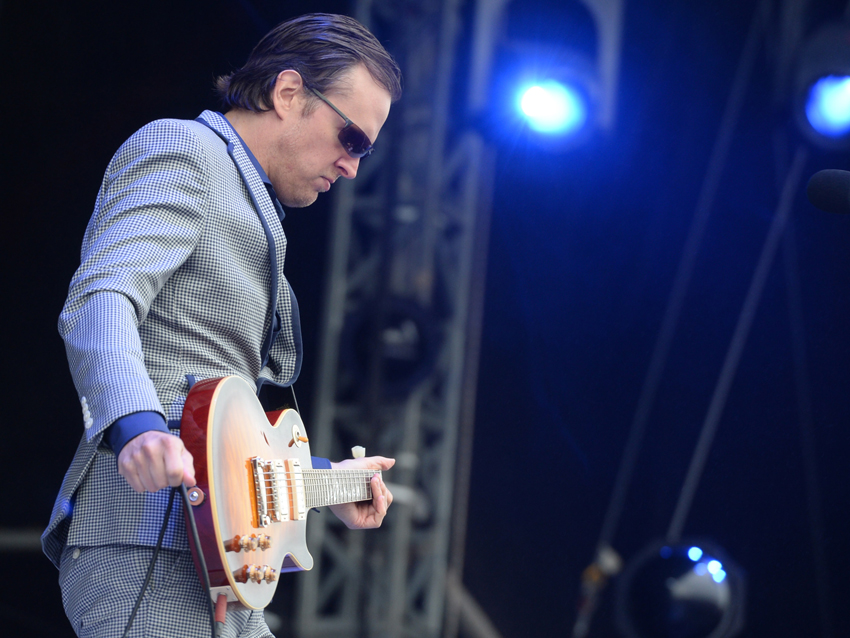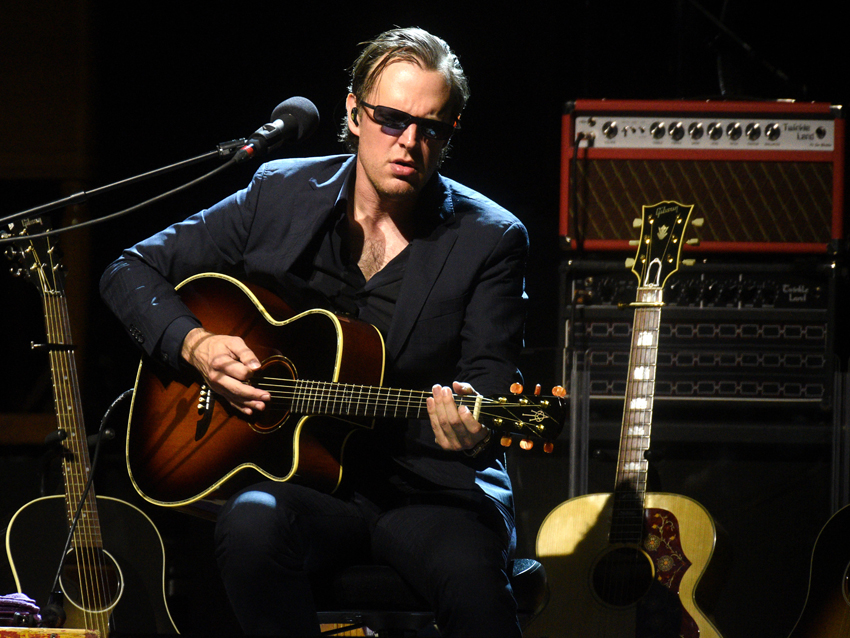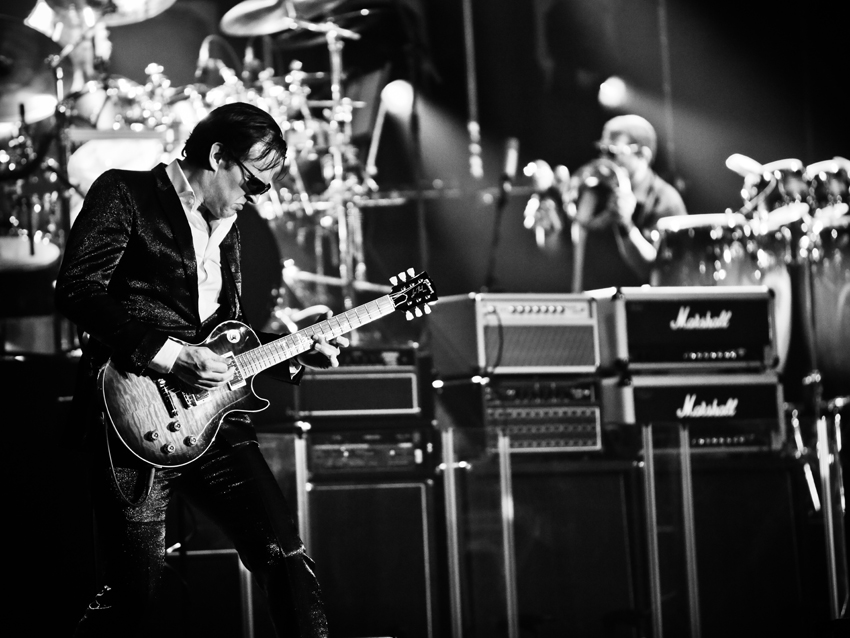
Joe Bonamassa's top 5 tips for guitarists
Joe Bonamassa has played his fair share of swanky joints – the Royal Albert Hall, the Red Rocks Ampitheatre, the Beacon Theater – but come January he'll cross another venue off his bucket list when he performs for two nights at the hallowed Radio City Music Hall in New York City.
"It really is something of a dream come true," Bonamassa says. "My mom and dad are coming down, so that'll be a lot of fun. It's a long way since playing the Mercury Lounge. One day, when I'm old and gray, I'll be able to go up to random people on the street and say, 'Yeah, Radio City, I played there – not one night, but two."
Sonically, Bonamassa says he prefers theaters to other venues. "I've played arenas and festivals and all those places, and they can be cold and echo-y," he notes. "Radio City will be much better when it comes to sound. And there's such a great vibe in the place, too – very welcoming."
Asked about any famous shows he's seen at Radio City, Bonamassa recalls a particular family outing to the prestigious theater when he was a teenager. "We went to see Liza Minnelli," he says. "She was doing something like a dozen dates. My manager’s dad managed Liza back in the ‘80s and ‘90s, so he got my whole family tickets; we even took my grandmother. So years from now, I can tell those same people on the street, ‘Hey, I played the same place as Liza.’ We’ll have that in common.”
After wrapping his 2014 tour in Fort Myers, Florida, Bonamassa will break for the holidays before hitting the road again in Albany, New York, on January 19, four days before his Radio City engagement. Just before closing out a banner year, Bonamassa sat down with MusicRadar to run down his top five tips for guitarists. (To purchase tickets for Joe Bonamassa at Radio City Music Hall, January 23 and 24, visit RadioCity.com.)

Learn how to tune your guitar
“I know this sounds kind of academic, but there's some tricks to tuning your guitar properly. When tune your guitar, play a bunch of chords you know to make sure they sound right. A lot of times the meter will say the guitar is in tune, but to my ear certain chords might sound a bit off.
“You want to know how to tune your guitar – that’s first off – but also, you should how to temper your technique so that chords, notes and your personal intonation are all perfectly in tune with the guitar. When you start playing chords, you need to consider things like how hard you press on the strings and where your fingers are placed off the fret. It’s a matter of systematically going through your bag of techniques, recording yourself and then listening back.
“Once you do this homework, you’ll start to see how valuable it is. You might have had experiences where you’re playing live or in rehearsal and you’re saying, ‘Who’s out of tune?’ And the answer might be that you're out of tune. This is especially important in the studio, which is a very unforgiving environment. You’ll find yourself doing take after take after take if you’re not in tune. That’s a real drag.”

Try plugging straight into the amp
“I know we live in an era of soundscape-ists, people who, in lieu of listening to Jimmy Bryant or Ry Cooder, can run a Holy Grail reverb pedal better than the next guy. And it can be fun to go on the internet and read all the product reviews or going on YouTube and checking out the latest pedals and digital plugins. I get it. But every once in a while, try plugging straight into the amp to see what happens. It can be a really liberating experience.
“When you do that, when you remove all the barriers between your guitar and the amp, you’ll force yourself to make something happen. Find the sounds that are in the Les Paul or the Telecaster or whatever it is you’re playing. Once you do that, then you can augment your sound with pedals. Oftentimes guys start out with 50 pedals or plugins or whatever, and they never really discover the sound that their hands, a guitar and an amp can make.
“I had that same disease for a long time, and I think it stunted my development as a player. At home, I would always plug right into the amp, but I would justify the onstage thing and say, ‘I need a tremolo and a flanger and a Leslie pedal,’ and on and on. Finally, I just said, ‘I don’t need any of this stuff. It’ll sound fine.’ I plugged into a Tweed Twin with just a wah-wah, and I said, ‘Hey, this is way more fun.’ It’s such a liberating experience to see what sounds you can get with your volume, your tone and your technique.”

Work on styles that you don't play for a living
“If you play blues for a living, work on country. If you play jazz for a living, work on blues. If you play country for a living, work on blues and jazz. And so on – if you play heavy metal, work on jazz and country.
“Ultimately, what you don’t want to be is a one-dimensional player. There are plenty of guys out there who can play their music and their music alone, but if you invite them to play something else, they won’t know where to start.They don't have any other kind of musical vocabulary.
“Maybe that’s fine for some players, but for most guys, they’re missing out by limiting themselves to only one style. Think about this, too: If you do check out some other genres and styles, when you go back to your main gig, you’re going to be equipped with a wide variety of sounds and riffs and sensibilities that you wouldn’t have if you just said, ‘I’m gonna play rock guitar, and that’s all I’m gonna do.’
“As for myself, I’ve always wanted to learn more of the Django gypsy jazz thing, where every downbeat is a different chord. John Jorgenson can do that stuff so well. It’s such a beatdown of a technique, so my hat’s off to him, man. When I get a little time, I’m going to try to get more of that down.”

Turn down your gain
“If you like the gain set at five, try it at four. I’ve discovered that people like to see you struggle a little bit. If you’re too comfortable on stage, chances are you’re not sweating enough for the music.
“If you have the gain turned up all the time, you’re going to sound like a vacuum cleaner. My tech, Mike Hickey, started working for us four years ago, and told me recently, ‘Joe, the amount of gain you have now is about a third of what it was when I started with you. There’s almost no sustain.’ It’s true – I probably get more sustain out of my acoustics than with my electrics.
“But that's OK because it forces me to play through every note. It’s good to be slightly on edge and uncomfortable; you want to keep that point on each note. If you’ve got too much gain, if it’s too comfy or too swirly in the reverb or whatever, it doesn’t impact the audience that much.”

Bring gear that's appropriate for the session
“If you’re lucky enough to play guitar for a living and you’re called to do a session that might not be your style of music, bring the gear that’s appropriate for that session, not what’s appropriate for your ego.
“This goes back to something Danny Gatton told me a long time ago: ‘If somebody calls you to play jazz, don’t bring your rock setup.’ In other words, don’t force your will on somebody else’s music. It’s egotistical, and not only that, you’ll sound out of place.
“If somebody called me to play with BB King, should I show up with two Jubilees, two Van Weeldens and two Dumbles, and go, ‘OK, where do I plug this in?’ Or should I show up with a 335 and a Twin, which would really let me serve the music? Time and time again, you’ll see some guy bring the wrong gear to a session. It might be right for his gig, but it’s not right for the gig he’s being called in for.
“This goes for anybody, whether you’re a hobbyist or an aspiring guitar god: Make sure you’re serving the music with what you bring gear-wise, headspace-wise, the whole deal. If you sound out of place, you’re not doing anybody any good.”
Joe is a freelance journalist who has, over the past few decades, interviewed hundreds of guitarists for Guitar World, Guitar Player, MusicRadar and Classic Rock. He is also a former editor of Guitar World, contributing writer for Guitar Aficionado and VP of A&R for Island Records. He’s an enthusiastic guitarist, but he’s nowhere near the likes of the people he interviews. Surprisingly, his skills are more suited to the drums. If you need a drummer for your Beatles tribute band, look him up.
